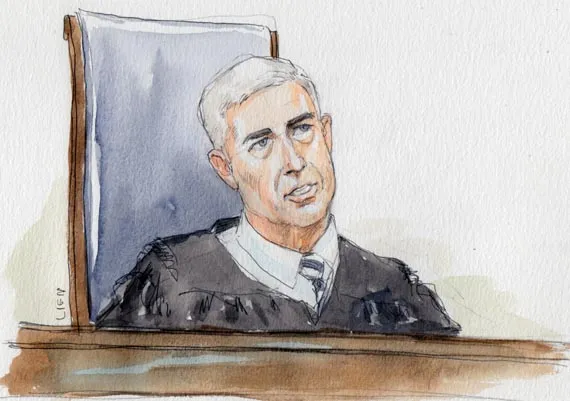Opinion analysis: Vagueness doctrine as a shield for criminal defendants
on Jun 24, 2019 at 2:25 pm

Today, as expected, the Supreme Court invalidated 18 U.S.C. § 924(c)(3)(B). In United States v. Davis, the court declared that the categorical approach is dead, and with it Section 924(c)(3)(B). Justice Neil Gorsuch wrote the opinion for a 5-4 majority (joined by the four more liberal justices), and Justice Brett Kavanaugh wrote the dissent.
This case involved the constitutionality of a federal criminal statute — Section 924(c). Section 924(c) makes it a crime to use a firearm during or in relation to a crime of violence, and Section 924(c)(3)(B) (now defunct) defined a crime of violence as “any other offense that is a felony and that, by its nature, involves a substantial risk that physical force against the person or property of another may be used in the course of committing the offense.”
In Sessions v. Dimaya, the Supreme Court held that the identical language was unconstitutionally vague when it appeared in Section 16(b), the general federal definition of a crime of violence. Today in Davis, the court said what is good for the goose is good for the gander: Section 924(c)(3)(B) is unconstitutionally vague as well.
In Davis, the federal government had agreed that Section 924(c)(3)(B), as currently interpreted, is unconstitutionally vague. Courts interpret Section 924(c) using the so-called categorical approach, which requires courts to assess whether the “typical version” of the defendant’s offense, defined by its elements, involves a substantial risk of force.
The government had urged the Supreme Court to kill the categorical approach in order to save Section 924(c). In its place, the government would have had courts assess whether the defendant’s actual conduct involved a substantial risk of force. Gorsuch’s majority opinion begins by conceding that a statute requiring an inquiry into the defendant’s actual conduct would not be unconstitutionally vague.
But, the majority continues, Section 924(c) is not that statute. Rather, after engaging in a straightforward exercise of statutory interpretation, the majority concludes that the text, structure and context of 924(c) all suggest that the statute requires courts to look at a generic offense and assess the risk of that offense, rather than the defendant’s conduct. The “language in the statute before us,” the majority goes on to say, “isn’t the language posited in the dissent’s push poll.” After determining the proper interpretation of Section 924(c), there was not much left for the majority to decide, because the court had already found that interpretation to be unconstitutionally vague in Dimaya.
Gorsuch’s majority opinion contains an interesting passage on the relationship between the doctrine of constitutional avoidance and the rule of lenity, which requires ambiguous criminal laws to be read in a defendant’s favor — an issue that he had raised at oral argument. The government had urged the court to invoke the canon of constitutional avoidance and interpret Section 924(c) in a way that would make it constitutional. The majority opinion primarily rejects the application of the canon of constitutional avoidance because the (much) better reading of the statute is that it requires the categorical approach.
But Gorsuch’s majority opinion suggests that the canon of constitutional avoidance is inapplicable for another reason as well. The opinion reasons:
[N]o one before us has identified a case in which this Court has invoked the canon to expand the reach of a criminal statute in order to save it… Employing the avoidance canon to expand a criminal statute’s scope would risk offending the very same due process and separation-of-powers principles on which the vagueness doctrine itself rests.
The majority opinion thus ensures that the canon of constitutional avoidance can function as a sword for criminal defendants. But it also declares that the vagueness doctrine operates as a shield to protect criminal defendants from attempts by the government to wield the constitutional-avoidance canon against them.
The opinion in Davis underscores an important jurisprudential difference in criminal cases between the two most recent nominees to the Supreme Court, Kavanaugh and Gorsuch. The tone of the majority opinion — and its concern about judges’ broadening already expansive criminal statutes — is very different from the tone of Kavanaugh’s dissent. The dissent opens with the claim that “crime and firearms form a dangerous mix,” and it then proceeds to discuss various statistics about violent crime. Against this backdrop, the dissent finds ways to interpret Section 924(c) that would save the statute, perhaps to rescue us from that “dangerous mix” of “crime and firearms.”
As I wrote in my argument analysis, Section 924(c) may be the last Johnson domino to fall — that is, the last criminal statute the Supreme Court invalidates on the basis of the court’s opinion in Johnson v. United States, which invalidated the Armed Career Criminal Act’s residual clause as unconstitutionally vague.
Johnson was a significant opinion, and so is Davis. But the reach of Johnson — and of Davis — will be dictated by the procedures that judges use to implement those decisions. For example, courts are addressing whether a defendant may be resentenced if the court that sentenced the defendant did not specifically identify which definition of “crime of violence” the court relied on — an invalid one, or one of the surviving ones. Another question that has divided the courts is whether a defendant who can be resentenced in light of Johnson (and now Davis) may rely on the Supreme Court’s subsequent decisions that interpret the scope of the other, still valid definitions of the phrase.
Those procedural questions will determine the reach of Davis and Johnson. Whether the Supreme Court will take up those questions, in addition to the flashier issues about whether particular provisions are unconstitutionally vague, remains to be seen.


